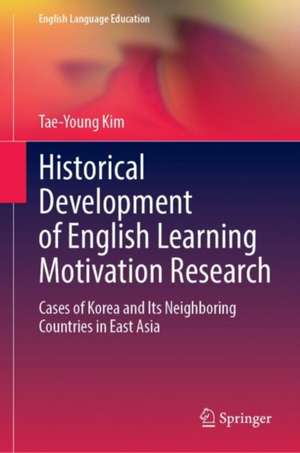Historical Development of English Learning Motivation Research: Cases of Korea and Its Neighboring Countries in East Asia: English Language Education, cartea 21
Autor Tae-Young Kimen Limba Engleză Hardback – 8 sep 2021
| Toate formatele și edițiile | Preț | Express |
|---|---|---|
| Paperback (1) | 1109.62 lei 6-8 săpt. | |
| Springer Nature Singapore – 9 sep 2022 | 1109.62 lei 6-8 săpt. | |
| Hardback (1) | 1115.63 lei 6-8 săpt. | |
| Springer Nature Singapore – 8 sep 2021 | 1115.63 lei 6-8 săpt. |
Din seria English Language Education
- 15%
 Preț: 643.84 lei
Preț: 643.84 lei - 18%
 Preț: 782.72 lei
Preț: 782.72 lei - 24%
 Preț: 846.66 lei
Preț: 846.66 lei - 24%
 Preț: 792.39 lei
Preț: 792.39 lei - 18%
 Preț: 1012.84 lei
Preț: 1012.84 lei - 18%
 Preț: 1008.12 lei
Preț: 1008.12 lei - 18%
 Preț: 1240.16 lei
Preț: 1240.16 lei - 20%
 Preț: 569.55 lei
Preț: 569.55 lei - 15%
 Preț: 643.00 lei
Preț: 643.00 lei - 18%
 Preț: 953.65 lei
Preț: 953.65 lei - 15%
 Preț: 589.02 lei
Preț: 589.02 lei - 15%
 Preț: 648.74 lei
Preț: 648.74 lei - 18%
 Preț: 1119.24 lei
Preț: 1119.24 lei - 18%
 Preț: 1116.57 lei
Preț: 1116.57 lei - 18%
 Preț: 727.00 lei
Preț: 727.00 lei - 18%
 Preț: 777.20 lei
Preț: 777.20 lei -
 Preț: 390.08 lei
Preț: 390.08 lei - 15%
 Preț: 636.30 lei
Preț: 636.30 lei - 18%
 Preț: 894.79 lei
Preț: 894.79 lei - 15%
 Preț: 637.28 lei
Preț: 637.28 lei - 18%
 Preț: 941.68 lei
Preț: 941.68 lei - 18%
 Preț: 724.17 lei
Preț: 724.17 lei - 18%
 Preț: 886.62 lei
Preț: 886.62 lei - 18%
 Preț: 885.63 lei
Preț: 885.63 lei - 18%
 Preț: 721.19 lei
Preț: 721.19 lei -
 Preț: 391.79 lei
Preț: 391.79 lei - 18%
 Preț: 784.48 lei
Preț: 784.48 lei -
 Preț: 389.31 lei
Preț: 389.31 lei - 18%
 Preț: 1115.28 lei
Preț: 1115.28 lei
Preț: 1115.63 lei
Preț vechi: 1360.52 lei
-18% Nou
Puncte Express: 1673
Preț estimativ în valută:
213.47€ • 222.90$ • 176.28£
213.47€ • 222.90$ • 176.28£
Carte tipărită la comandă
Livrare economică 15-29 aprilie
Preluare comenzi: 021 569.72.76
Specificații
ISBN-13: 9789811625121
ISBN-10: 9811625123
Ilustrații: XII, 318 p. 23 illus.
Dimensiuni: 155 x 235 mm
Greutate: 0.64 kg
Ediția:1st ed. 2021
Editura: Springer Nature Singapore
Colecția Springer
Seria English Language Education
Locul publicării:Singapore, Singapore
ISBN-10: 9811625123
Ilustrații: XII, 318 p. 23 illus.
Dimensiuni: 155 x 235 mm
Greutate: 0.64 kg
Ediția:1st ed. 2021
Editura: Springer Nature Singapore
Colecția Springer
Seria English Language Education
Locul publicării:Singapore, Singapore
Cuprins
Chapter 1 Introduction.- Chapter 2 Historical Overview of English Learning in South Korea: The 19th Century and Japanese Colonization.- Chapter 3 Historical Overview of English Learning in South Korea: The U.S. Military Government, Korean War, and Post-War Reconstruction Period.- Chapter 4 A Historical Overview of English Learning in South Korea: An Era of Economic and Cultural Prosperity from the 1990s to the 2010s.- Chapter 5 History of English Learning and Its Motivation in Other East Asian Countries.- Chapter 6 Recent Advances in EFL (De)Motivation Theory.- Chapter 7 Sociohistorical Genesis of Korean EFL Learners’ English Learning Motivation.- Chapter 8 Conclusion.
Notă biografică
Tae-Young Kim (CAU Distinguished Scholar 2014-2016) graduated from the Ontario Institute for Studies in Education of the University of Toronto (Ph.D., 2007) and from Seoul National University (M.A., 2002; B.A., 1997). He has been teaching in the Department of English Education at Chung-Ang University, Seoul, Korea since 2008. He teaches various courses related to L2 motivation, applied linguistics, and quantitative/qualitative research methods in ELT. His main area of research interest is L2 learning/teaching (de)motivation particularly in the context of English as a foreign language. He has published over 170 academic journal articles and book chapters on L2 learning motivation and co-edited a book entitled Second Language Teacher Motivation, Autonomy and Development in East Asia.
Textul de pe ultima copertă
This book clarifies the fundamental difference between North America-based instrumental motivation and Korea (and East Asia)-specific competitive motivation by which the EFL learners’ excessive competition to be admitted to famous universities and to be hired at a large-scale conglomerate is the main source of L2 motivation. It enables readers to understand that EFL-learning motivation reflects unique sociohistorical contexts grounded in a specific region or country. This book in turn necessitates the need to develop EFL motivation theory and research tradition which are firmly based on East Asian values and culture.
Caracteristici
Highlights unique features of English-learning motivation in South Korea Clarifies the fundamental difference between North America-based instrumental motivation and Korea (and East Asia)-specific competitive motivation Helps readers understand that EFL-learning motivation reflects unique sociohistorical contexts grounded in Korea?
